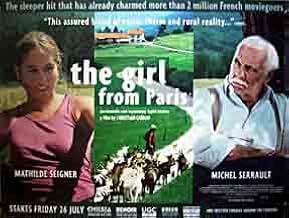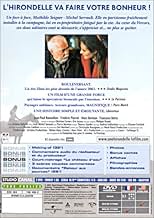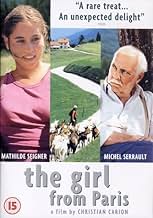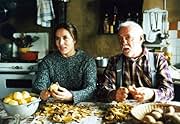PUNTUACIÓN EN IMDb
6,6/10
2,5 mil
TU PUNTUACIÓN
Sandrine, una mujer de unos treinta años se cansa de la vida en París y decide dejar su trabajo en las computadoras y convertirse en agricultora.Sandrine, una mujer de unos treinta años se cansa de la vida en París y decide dejar su trabajo en las computadoras y convertirse en agricultora.Sandrine, una mujer de unos treinta años se cansa de la vida en París y decide dejar su trabajo en las computadoras y convertirse en agricultora.
- Dirección
- Guión
- Reparto principal
- Premios
- 3 premios y 2 nominaciones en total
Reseñas destacadas
"The Girl From Paris" is not a film the average person would likely watch. It's got subtitles, is very slow and deliberately paced and is about a young lady who abandons Paris to live and work on a farm. But it is a lovely film...one well worth seeing.
Sandrine (Mathilde Seigner) is on a farm owned by Adrien (Michel Serrault) when the film begins. She is looking it over and deciding whether or not to buy the place. So, instead of showing the steps leading up to Sandrine giving up her old life and moving to the farm, the film is more like a snapshot of her life...a small period in which she's already made the decision and has taken classes on agriculture. This is not a bad thing...just unusual that the context isn't important to the film.
As for the elderly Adrien, it's obvious early on that he isn't happy about selling and seems to have little interest nor regard for Sandrine and her new life. He seems, at best, indifferent or perhaps contemptuous of her decision. Slowly, however, through the course of the film the two become closer, as although he's sold the farm, he remains behind in his home while Sandrine lives in a nearby trailer.
Not surprisingly, as time passes, Sandrine and Adrien become a bit closer and he actually begins to talk...something he very rarely did earlier in the film. And, at times, her life is very tough as they live in a mountainous portion of the country....with lots of snow, cold and loneliness.
While none of this sounds exciting or wonderful, the film is very nice if you just accept it for what it is. Don't expect fireworks or romance or great depth....just see two people living their lives and, oddly, you will find that you care and enjoy these little moments.
By the way, I have some words of warning about the film. It is a no holds barred look at farm life. You see a pig brutally killed with lot of blood, several cows being killed and a goat having a stillbirth. It's not a film for the overly tender-hearted....but it is what farm life is often...the good and the ugly.
Sandrine (Mathilde Seigner) is on a farm owned by Adrien (Michel Serrault) when the film begins. She is looking it over and deciding whether or not to buy the place. So, instead of showing the steps leading up to Sandrine giving up her old life and moving to the farm, the film is more like a snapshot of her life...a small period in which she's already made the decision and has taken classes on agriculture. This is not a bad thing...just unusual that the context isn't important to the film.
As for the elderly Adrien, it's obvious early on that he isn't happy about selling and seems to have little interest nor regard for Sandrine and her new life. He seems, at best, indifferent or perhaps contemptuous of her decision. Slowly, however, through the course of the film the two become closer, as although he's sold the farm, he remains behind in his home while Sandrine lives in a nearby trailer.
Not surprisingly, as time passes, Sandrine and Adrien become a bit closer and he actually begins to talk...something he very rarely did earlier in the film. And, at times, her life is very tough as they live in a mountainous portion of the country....with lots of snow, cold and loneliness.
While none of this sounds exciting or wonderful, the film is very nice if you just accept it for what it is. Don't expect fireworks or romance or great depth....just see two people living their lives and, oddly, you will find that you care and enjoy these little moments.
By the way, I have some words of warning about the film. It is a no holds barred look at farm life. You see a pig brutally killed with lot of blood, several cows being killed and a goat having a stillbirth. It's not a film for the overly tender-hearted....but it is what farm life is often...the good and the ugly.
Sandrine, a parisien girl, fed up with her unfulfilling existence as a computer trainer and the everyday problems of city life decides to leave the Paris to become a peasant farmer.
Sandrine buys a farm high on the Vercors plateau in South-East France from Adrien, an old peasant suspicious of Sandrine's college ideas. It's spring and Sandrine makes a good start, developing other aspects of the farm, a rural Gite welcomes travellers and school parties and a Web sites advertises goat's cheese.
Although the locals are suspicious they are perhaps more accepting of a young, dynamic outsider free of the petty local rivalries that set family against family in these close knit rural communities. This is no Jean de Florette and is illustrated when Adrien defends the changes Sandrine has made to his mates in the village bar.
However the rural idyll is not all that it might seem to city folk. The audience is confronted with graphic scenes of a pig having its throat cut to make Boudin (black pudding) and later of mad cows being killed with a bolt gun. Winter comes and the sense of despair and isolation felt by many small farmers is complete when we see Sandrine in long shot, alone in the barn after one of her goats has stillborn kids.
The film explores the conflicts between conformable but ultimately pointless city life - going nowhere in the Paris traffic and the savage beauty of life on the isolated Vercors plateau. Even the peasants shop at the local hypermarket in Grenoble.
Adrien's initial scepticism gives way to a hope that Sandrine will carry on his farm but he has difficulty with the rapprochement, perhaps caused by events in his own life. The Nazis burned his farm in '44 looking for maquisards and later Government men arrive to kill and burn his cattle infected with mad cow disease. Are the government men worse than the Germans? For Adrien maybe, as these events lead to the death of his wife.
Like the Vercors, Sandrine seems both beautiful but uncompromising but we see constant flashes of the temperament that, like the weather vane in front of her house, cause her to make sudden changes affecting those around her. She is really quite vulnerable needing the occasional love of her city boyfriend and the friendship of Adrien. Maybe it is this qualities that will lead to her eventual success?
A final comment, like many movies these days there is quite a bit of product placement - Volvo cars, Lowe mountain gear, Carrefour but the countryside is wonderfully shot.
Sandrine buys a farm high on the Vercors plateau in South-East France from Adrien, an old peasant suspicious of Sandrine's college ideas. It's spring and Sandrine makes a good start, developing other aspects of the farm, a rural Gite welcomes travellers and school parties and a Web sites advertises goat's cheese.
Although the locals are suspicious they are perhaps more accepting of a young, dynamic outsider free of the petty local rivalries that set family against family in these close knit rural communities. This is no Jean de Florette and is illustrated when Adrien defends the changes Sandrine has made to his mates in the village bar.
However the rural idyll is not all that it might seem to city folk. The audience is confronted with graphic scenes of a pig having its throat cut to make Boudin (black pudding) and later of mad cows being killed with a bolt gun. Winter comes and the sense of despair and isolation felt by many small farmers is complete when we see Sandrine in long shot, alone in the barn after one of her goats has stillborn kids.
The film explores the conflicts between conformable but ultimately pointless city life - going nowhere in the Paris traffic and the savage beauty of life on the isolated Vercors plateau. Even the peasants shop at the local hypermarket in Grenoble.
Adrien's initial scepticism gives way to a hope that Sandrine will carry on his farm but he has difficulty with the rapprochement, perhaps caused by events in his own life. The Nazis burned his farm in '44 looking for maquisards and later Government men arrive to kill and burn his cattle infected with mad cow disease. Are the government men worse than the Germans? For Adrien maybe, as these events lead to the death of his wife.
Like the Vercors, Sandrine seems both beautiful but uncompromising but we see constant flashes of the temperament that, like the weather vane in front of her house, cause her to make sudden changes affecting those around her. She is really quite vulnerable needing the occasional love of her city boyfriend and the friendship of Adrien. Maybe it is this qualities that will lead to her eventual success?
A final comment, like many movies these days there is quite a bit of product placement - Volvo cars, Lowe mountain gear, Carrefour but the countryside is wonderfully shot.
a slow tempo movie, with no big scenes, no breathtaking special effects, just a small number of actors and the peaceful scenery of the French alps that touch the heart. all these are the background of the slow development of the relationship between the 2 main characters of the story. Sandrine, a young Parisian woman, who decided to leave the big city and buy a farm at the French alps. Adrian is the old owner of the farm, who remained living at the farm after the sale, but at first, refuses to help Sandrine and guide her. the peaceful yet cruel nature is the background of the mutual process that the two characters experience. the old man and the young woman who learn to accept each other and even like each other very much.
This is a very nice movie that most English-speaking movie goers will never see. Here in the USA it has the title "Girl From Paris", but the French title translates to "one swallow brought spring." Mathilde Seigner, unknown to me before this movie, plays Sandrine Dumez, a single young lady, approaching 30, and living in Paris. One day while running late because of bad traffic, she decides to follow her dream, to get away from the city and become a farmer. This is her story, and also how her life touched that of an old man who thought he had nothing to live for. She was his 'swallow'. Although it is all in French, the subtitles are easy to read and is not a distraction at all. I would recommend it to anyone who likes a good story.
SPOILERS FOLLOW. Sandrine enrolls in a two year school to study farming. She is one of the better students and a hard worker. She finds a farm to buy in a beautiful hilly area somewhere between Paris and Grenoble, probably closer to Grenoble. The old owner had lost his wife some years back, and was just tired of farming, but he didn't look kindly upon "school" farmers, and wasn't very helpful at first. In fact it seemed like he wanted her to fail, even though he had contracted to remain living there for 18 months. But he slowly warmed up to her when he saw how kind she was, and how hard she worked. She converted one building into a hotel and advertised it over the internet as "Balconies in the Sky." She sold her goat cheese over the internet. She worked hard every day. Her business was good.
In a key scene during the cold winter, we see him causing a problem with her hotel's electricity, and we assume he is up to no good. But, what he wanted was for her to be near him, so without heat, he invited her to stay with him in the old guest bedroom. A few days later, he fixed the problem. They shared meals and conversation, and they even danced. Not long before, a sour old man, he now had a little joy in his life.
After a particularly hard winter, Sandrine had to take a break, went back to Paris, even taught two days of an internet class. She considered whether she should go back, and decided to. The movie ends with her leading the goats back to the barn in the spring.
SPOILERS FOLLOW. Sandrine enrolls in a two year school to study farming. She is one of the better students and a hard worker. She finds a farm to buy in a beautiful hilly area somewhere between Paris and Grenoble, probably closer to Grenoble. The old owner had lost his wife some years back, and was just tired of farming, but he didn't look kindly upon "school" farmers, and wasn't very helpful at first. In fact it seemed like he wanted her to fail, even though he had contracted to remain living there for 18 months. But he slowly warmed up to her when he saw how kind she was, and how hard she worked. She converted one building into a hotel and advertised it over the internet as "Balconies in the Sky." She sold her goat cheese over the internet. She worked hard every day. Her business was good.
In a key scene during the cold winter, we see him causing a problem with her hotel's electricity, and we assume he is up to no good. But, what he wanted was for her to be near him, so without heat, he invited her to stay with him in the old guest bedroom. A few days later, he fixed the problem. They shared meals and conversation, and they even danced. Not long before, a sour old man, he now had a little joy in his life.
After a particularly hard winter, Sandrine had to take a break, went back to Paris, even taught two days of an internet class. She considered whether she should go back, and decided to. The movie ends with her leading the goats back to the barn in the spring.
'Une hirondelle a fait le printemps' ('The Girl from Paris') weaves its French spell in the manner of the great French filmmakers, and yet this 2001 film was the debut of the man - Christian Carion - who later gave us the tremendously well-done 'Joyeux Noël' in 2005. This story (written by both Carion and Eric Assous) is unique, a study of human desires, needs, and compromises that is more human in feeling than most any other film this reviewer has seen.
Sandrine Dumez (Mathilde Seigner) lives in Paris where she slaves away at teaching computer science to students in tune with the age. She is attractive, successful, popular...and unhappy. She longs to fulfill the dreams of her childhood and become a farmer. Much against her doting mother's advice she enrolls in a school for agriculture and eventually graduates as one of the top students, winning the ability to buy a farm in the Rhone Alps. The snag: the elderly crusty owner Adrien (Michel Serrault), who wants to sell his farm yet maintain his idyllic country existence without the wear and tear of farming, refuses to move off his own property once the contract is signed for Sandrine to take over the land. Sandrine allows Adrien to stay, makes the farm not only succeed despite her novice status, but also adds a hotel ('The Balcony of the Sky') to enhance her income from her goat farm whose chief product is cheese. Encouraging the transition is the jovial neighbor Jean (Jean-Paul Roussillon) whose recent selling of his own farm allows him to travel around in his new Volvo with his trusty (and hilarious) dog Pharaoh. Jean warns Sandrine that when winter come Adrien will become a recluse (remembering the loss of his wife, the Nazi decimation of the French farms, his losses from mad cow disease in the past, etc), yet Sandrine persists - until the winter comes and all but defeats her optimism. Events bond Adrien and Sandrine more closely, so much so that when Sandrine returns to Paris for a much-needed breather - and liaison with her ex-boyfriend Gérard (Frédéric Pierrot) - Adrien discovers how important to him Sandrine has become. The ending is tied into a surprise that touchingly resolves many doubts and questions and allows the viewer to finish the story on his own! The cast is superb, with special kudos to Michel Serrault, a consummate actor. The cinematography of the glorious farm location is by Antoine Héberlé and the very French musical score is by Philippe Rombi. The film is a delight in every aspect and one that deserves repeated viewings. Grady Harp
Sandrine Dumez (Mathilde Seigner) lives in Paris where she slaves away at teaching computer science to students in tune with the age. She is attractive, successful, popular...and unhappy. She longs to fulfill the dreams of her childhood and become a farmer. Much against her doting mother's advice she enrolls in a school for agriculture and eventually graduates as one of the top students, winning the ability to buy a farm in the Rhone Alps. The snag: the elderly crusty owner Adrien (Michel Serrault), who wants to sell his farm yet maintain his idyllic country existence without the wear and tear of farming, refuses to move off his own property once the contract is signed for Sandrine to take over the land. Sandrine allows Adrien to stay, makes the farm not only succeed despite her novice status, but also adds a hotel ('The Balcony of the Sky') to enhance her income from her goat farm whose chief product is cheese. Encouraging the transition is the jovial neighbor Jean (Jean-Paul Roussillon) whose recent selling of his own farm allows him to travel around in his new Volvo with his trusty (and hilarious) dog Pharaoh. Jean warns Sandrine that when winter come Adrien will become a recluse (remembering the loss of his wife, the Nazi decimation of the French farms, his losses from mad cow disease in the past, etc), yet Sandrine persists - until the winter comes and all but defeats her optimism. Events bond Adrien and Sandrine more closely, so much so that when Sandrine returns to Paris for a much-needed breather - and liaison with her ex-boyfriend Gérard (Frédéric Pierrot) - Adrien discovers how important to him Sandrine has become. The ending is tied into a surprise that touchingly resolves many doubts and questions and allows the viewer to finish the story on his own! The cast is superb, with special kudos to Michel Serrault, a consummate actor. The cinematography of the glorious farm location is by Antoine Héberlé and the very French musical score is by Philippe Rombi. The film is a delight in every aspect and one that deserves repeated viewings. Grady Harp
¿Sabías que...?
- CuriosidadesAt one point the farmers tie a bottle to a pear tree and stick a small branch with a blossom inside. They do this so, in a few months, the result will be a full sized pear inside the bottle, much too big to have been put into the bottle in the usual way. One of the farmers uses it to make a bottle of a pear flavored alcoholic drink, with the pear still inside, and the bottle, pear, and drink appear late in the film when the two farmers and Sandrine have a drink together.
- Pifias1:10:30 - Sandrine enters the goat barn. She is not wearing a watch. Few seconds later she assists a goat that gives birth to a lamb. She then is wearing a watch on her left arm.
Selecciones populares
Inicia sesión para calificar y añadir a tu lista para recibir recomendaciones personalizadas
- How long is The Girl from Paris?Con tecnología de Alexa
Detalles
- Fecha de lanzamiento
- País de origen
- Sitios oficiales
- Idioma
- Títulos en diferentes países
- The Girl from Paris
- Localizaciones del rodaje
- Empresas productoras
- Ver más compañías en los créditos en IMDbPro
Taquilla
- Presupuesto
- 25.000.000 FRF (estimación)
- Recaudación en Estados Unidos y Canadá
- 183.266 US$
- Fin de semana de estreno en EE. UU. y Canadá
- 8280 US$
- 23 mar 2003
- Recaudación en todo el mundo
- 12.812.396 US$
Contribuir a esta página
Sugerir un cambio o añadir el contenido que falta






















